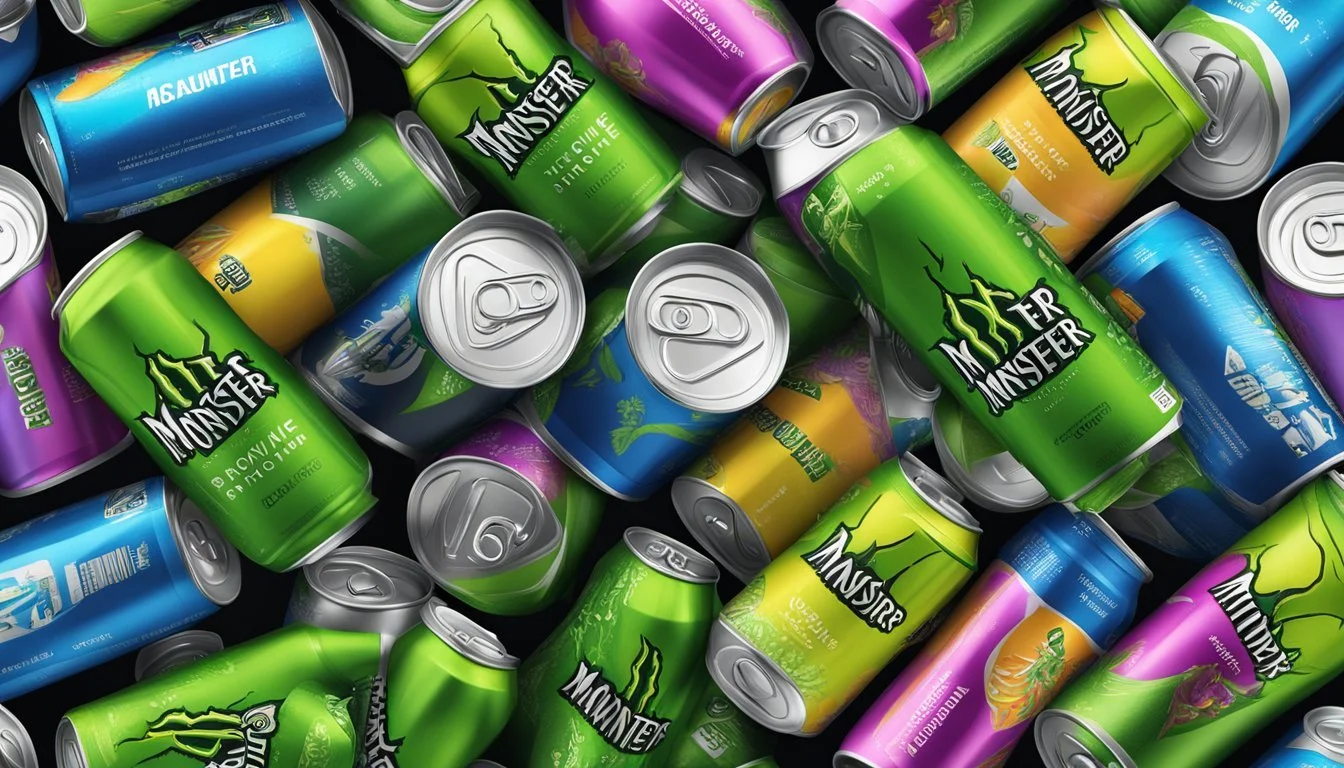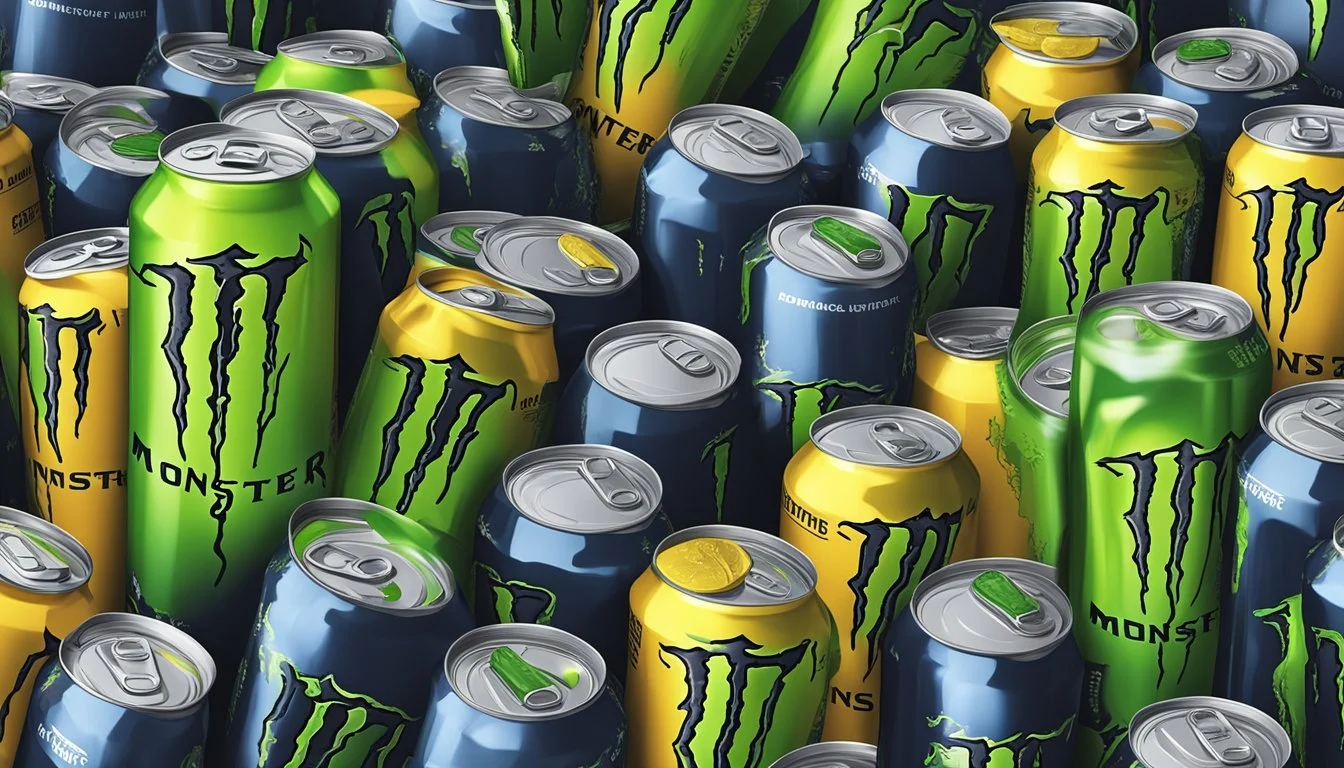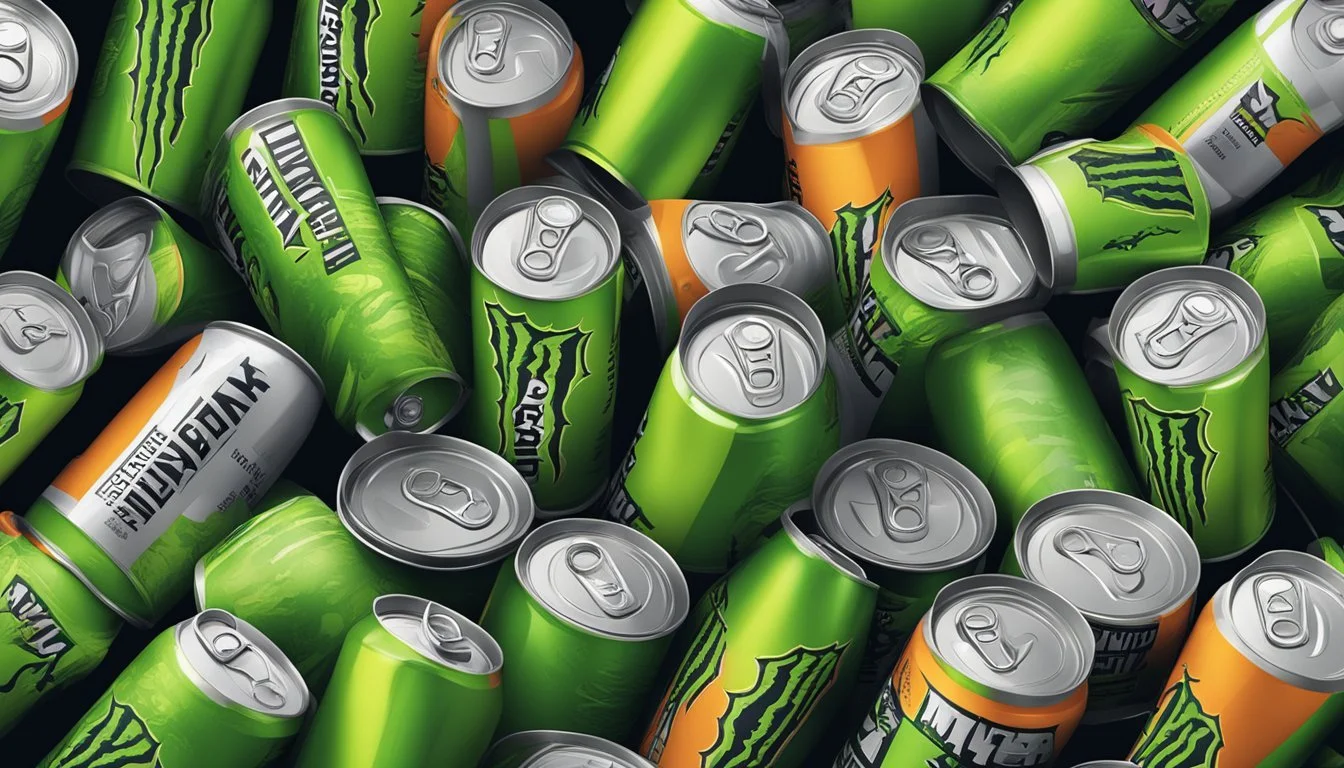How Many Cans of Monster Energy Drink Per Day Is Too Much?
Safe Consumption Guidelines
Consuming Monster Energy Drinks has become a daily ritual for many seeking a quick boost of energy and alertness. However, there are health implications that must be considered when regular consumption of such high-caffeine beverages becomes part of one's routine. Monster Energy Drink contains 54 grams of sugar and 160 milligrams of caffeine per 16 fluid ounce can. This puts it on the high end of the caffeinated beverage spectrum. Given that the American Heart Association recommends no more than 25 grams of sugar per day for women and 36 grams for men, and health experts recommend capping daily caffeine intake at around 200 milligrams for most adults, it's evident that moderation is key.
The potential repercussions of excessive consumption can impact both the cardiovascular system and overall health. Health risks may include elevated heart rate, irregular heartbeats, and more severe complications such as hypertensive heart disease and coronary artery disease. Weight gain can also be a consequence due to the high sugar content. These concerns highlight the importance of limiting intake.
In light of these facts, health professionals advise adults who consume energy drinks like Monster to limit their consumption to one can per day. This upper limit aligns with nutritional guidelines concerning both sugar and caffeine intake, aiming to mitigate health risks while still providing the sought-after energy boost. Regardless of tolerance levels or habitual consumption, it is advisable to remain within these guidelines to promote long-term health and well-being.
Understanding Caffeine
In the context of energy drinks, specifically Monster Energy Drinks, it is crucial to comprehend the caffeine content, how it compares to other beverages, and its impacts on health.
Caffeine Content in Monster Energy Drinks
Monster Energy Drinks contain 160 mg of caffeine per 16-ounce can. For those preferring a larger size, the 24-ounce Mega Monster boasts about 240 mg of caffeine. These numbers are consistent with the caffeine levels found in energy drinks of similar sizes.
Comparison With Coffee, Tea, and Other Drinks
To provide perspective, here is a comparison with common caffeine-containing beverages:
Coffee (8 oz): Approximately 96 mg of caffeine
Tea (8 oz): Ranges from 14-70 mg of caffeine, depending on type and brewing time
When comparing Monster Energy Drinks to these standard beverages, it’s evident that a single 16-ounce can roughly equals two cups of coffee in terms of caffeine content.
Caffeine and Health: Pros and Cons
Caffeine, a powerful stimulant, can have both positive and negative effects on health. Here's a brief overview:
Pros:
Enhanced mental alertness
Increased concentration
Cons:
Potential for caffeine overconsumption
Possible health risks associated when consumed in excess, including sleep disturbances and cardiovascular issues
The recommended maximum caffeine intake for most adults is about 400 mg per day. Each individual's sensitivity to caffeine can vary, so it's important to monitor one's own response to the stimulant.
Energy Drinks and Ingredients
Energy drinks typically contain a unique blend of caffeine, sugar, and other energy-boosting ingredients. These substances are designed to increase alertness and improve mental and physical performance.
Main Ingredients in Energy Drinks
The core components of most energy drinks include caffeine, sugar, and B-vitamins. Caffeine is the primary stimulant, known for enhancing alertness and endurance. Sugar provides a rapid source of energy, although in significant quantities, it can contribute to the total caloric intake. Many energy drinks also contain artificial sweeteners like sucralose to provide sweetness without the added calories.
Caffeine: Ranges from 70 to 200 mg per serving.
Sugar: Can be 54 grams per can or more.
B-Vitamins: Often added to support metabolism.
Role of Taurine, Guarana, and Ginseng
Taurine is an amino acid that supports neurological development and helps regulate water and mineral salts in the blood. Guarana extract, derived from a Brazilian plant, is another source of caffeine but is believed to release more slowly than caffeine from coffee beans, providing a prolonged energy effect. Ginseng is a root that may help boost energy levels and has been used in traditional Chinese medicine for centuries.
Taurine: Typically about 1000 mg per serving.
Guarana: Contains caffeine, but releases it slowly.
Ginseng: Used in many energy drinks for its potential energizing effects.
Sugar and Artificial Sweeteners
Energy drinks often have high levels of sugar, which can lead to a spike in blood sugar and may carry a risk of overconsumption. To reduce calorie content, drinks can also contain artificial sweeteners like sucralose. While these provide sweetness without the same blood sugar spike, their long-term effects are still subject to research.
Sugar: Linked to energy spikes and crashes.
Artificial Sweeteners (sucralose): Provides sweetness without affecting blood sugar.
Health Implications of Excessive Consumption
Consuming too many cans of Monster energy drinks daily can lead to serious health complications. This section explores the varied health risks stemming from excessive intake.
Effects on Heart Rate and Blood Pressure
Increased heart rate and elevated blood pressure are common symptoms after ingesting high amounts of caffeine found in energy drinks such as Monster. These symptoms can escalate to more severe cardiovascular issues like hypertensive heart disease and coronary artery disease.
Sleep Disturbances and Insomnia
Energy drinks contain stimulants that can significantly disrupt normal sleep patterns. Individuals who consume Monster energy drinks in large amounts or close to bedtime may experience insomnia and other sleep disturbances.
Risks to Children and Adolescents
Children and adolescents are particularly sensitive to the high levels of caffeine and sugar in Monster energy drinks. Excessive consumption can lead to hyperactivity, concentration difficulties, and heightened blood pressure.
Potential Link to Type 2 Diabetes
The high sugar content in many energy drinks can contribute to an increased risk of developing type 2 diabetes. This is due to the body's impaired ability to manage insulin and blood sugar levels effectively with high sugar intake.
Obesity and Weight Gain Concerns
Monster energy drinks are high in calories and sugar, which can contribute to weight gain and obesity when consumed in large quantities. This, in turn, can increase the risk of numerous related health issues.
Daily Intake Recommendations
It is widely recognized that moderation is key for consumption of stimulants such as caffeine found in energy drinks. The American Academy of Pediatrics, American Heart Association, and the FDA provide specific recommendations regarding the intake of these beverages, especially for certain groups.
American Academy of Pediatrics' Stance
The American Academy of Pediatrics (AAP) strongly advises against the consumption of energy drinks for children and adolescents. They outline that stimulants like caffeine can have adverse effects on developing bodies. The AAP has made it clear that there is no room for energy drinks in the diets of young people.
American Heart Association's Advice
The American Heart Association (AHA) recommends that adults should limit their intake of added sugars, which are abundant in many energy drinks. They are particularly cautious about the cardiovascular risks associated with excessive consumption of stimulant-heavy beverages. As such, the AHA's guidance indirectly suggests limiting the consumption of energy drinks to adhere to their sugar intake recommendations.
FDA Considerations on Energy Drinks
The Food and Drug Administration (FDA) acknowledges that energy drinks contain high levels of caffeine. Their guidelines suggest that the average adult should cap their caffeine consumption at 400 milligrams per day. Given that a standard 16-ounce can of Monster Energy contains approximately 160 milligrams of caffeine, consumers should ideally restrict themselves to no more than two to three cans per day to stay within safe limits. However, it's also important to account for other sources of caffeine in one's diet.
Monster Energy Drink Specifics
Within the landscape of energy drinks, Monster has carved out a considerable niche. This section scrutinizes the drink's caffeine and sugar specifics, examines its sugar-free and diet variations, and addresses potential side effects associated with its consumption.
Distinguishing Monster From Other Brands
Monster Energy stands out in the energy drink market with a 5.9% global market share. It's known for its distinctive branding and a broad selection of flavors that have made it a favorite among consumers. Compared to major competitors, its price point is relatively moderate and accessible.
Analyzing Monster's Caffeine and Sugar Levels
A standard 16 fl. oz can of Monster Energy contains approximately:
Caffeine: 160 mg
Sugar: 54 grams
It's recommended to limit the caffeine intake to 400 mg per day, so consuming more than two cans of Monster Energy surpasses the advised caffeine guidelines. The high sugar content also raises health concerns related to excessive sugar intake.
Sugar-Free and Diet Options
For consumers looking to reduce sugar intake, Monster Energy provides sugar-free and diet alternatives. These options offer similar energy-boosting effects without the high sugar levels found in the original formula. These versions contain artificial sweeteners and may vary in their caffeine content.
Associated Side Effects and Symptoms
Exceeding the daily recommended intake of Monster Energy may lead to:
Side Effects: Heart palpitations, insomnia, headaches, irritability
Symptoms: Dehydration, caffeine overdose symptoms, elevated blood sugar levels
These adverse effects highlight the importance of moderation in the consumption of Monster Energy Drinks.
Mental and Physical Effects
In evaluating the impact of Monster Energy drinks, one must consider the acute effects on mental and physical health, ranging from cognitive function to mood regulation.
Cognitive Function and Alertness
The caffeine content in a 16-ounce can of Monster Energy is 164 milligrams, which is significantly higher than the average 96 milligrams found in an eight-ounce cup of coffee. This caffeine level can lead to improved alertness and cognitive performance in the short term. However, excessive intake can lead to overstimulation, causing restlessness and sleep disturbances.
Physical Performance Enhancements
Monster Energy drinks are often consumed for their ability to enhance physical performance. They provide a quick source of energy that can improve endurance and reaction time. Despite this, there are potential downsides such as increased heart rate and blood pressure, which could pose risks, especially during intense physical activity.
Short-term Energy Boost vs. Long-term Effects
While Monster Energy can offer a short-term energy boost, its high caffeine and sugar content can lead to a cycle of highs and lows in energy levels. Over time, this may result in negative long-term health effects, including a possibility of addiction and increased risk of metabolic disorders.
Mood and Anxiety Considerations
The consumption of Monster Energy can affect one's mood, often leading to a temporary feeling of euphoria due to the sugar and caffeine rush. However, they can also contribute to anxiety and agitation, particularly in individuals consuming them in high volumes or who have a sensitivity to caffeine.
Safety and Consumption Guidelines
When considering how many cans of Monster Energy drink one may consume in a day, it is essential to understand safe caffeine levels, the importance of hydration, potential interactions with alcohol and medications, and the signs of caffeine overdose.
Assessing Safe Levels of Caffeine Intake
The safe consumption level of caffeine for most adults is up to 400 milligrams per day. One can of Monster Energy typically contains around 160 milligrams. They should limit themselves to no more than two cans per day to stay within safe caffeine intake levels, especially since caffeine can also come from other sources like coffee, tea, and chocolate.
Maximum safe caffeine for most adults: 400 mg/day
Caffeine per Monster can: ~160 mg
Recommended limit: ≤ 2 cans/day
Hydration and Energy Drink Intake
Energy drinks contain caffeine, which has diuretic properties, meaning it can lead to increased urination and risk of dehydration. Individuals should balance their intake of Monster Energy drinks with plenty of water. Hydration is key, hence one should aim to drink at least 8 glasses of water a day, in addition to limiting their energy drink consumption.
Daily water intake: 8 glasses (64 oz)
Balance with Monster intake: Water > Energy drinks
Interactions With Alcohol and Medications
Mixing Monster Energy drinks with alcohol can mask the effects of intoxication, leading to riskier behaviors. Additionally, caffeine can interact with certain medications, altering their effectiveness or causing side effects. It’s important to consult a healthcare provider if one is consuming energy drinks while taking prescribed medications.
Risks: Masked intoxication, medication interaction
Caution: Consult healthcare provider
Recognizing Signs of Caffeine Overdose
Overconsumption of caffeine can lead to a caffeine overdose, which is a serious health concern. Recognizing the signs is important for safety. Symptoms can include palpitations, high blood pressure, nausea, and in severe cases, seizures. If these symptoms occur, immediate medical attention is necessary.
Signs of overdose:
Palpitations
High blood pressure
Nausea
In severe cases: Seizures






